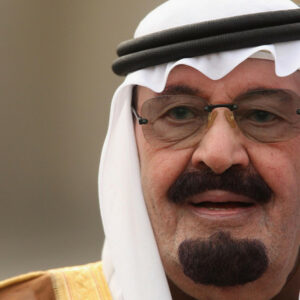From 2005 to 2015, Abdullah bin Abdulaziz Al Saud was the King of Saudi Arabia and the world’s third wealthiest head of state. During his reign, he was also the custodian of Two Holy Mosques and the Prime Minister of the Council of Ministers as well as the Commander of the National Guard. From an early age, he had a deep regard for religion, history, and the Arab legacy as one of the numerous sons of Saudi Arabia’s founder king, Abdulaziz Ibn Saud. King Faisal appointed him to command the National Guard, and after King Khalid’s ascension, he became the Second Deputy Prime Minister. When King Fahd took the throne, Abdullah was named Crown Prince and Deputy Prime Minister, he was placed next in line for the throne. After King Fahd suffered a major stroke in 1995, Abdullah became the de facto ruler of Saudi Arabia until King Fahd’s death a decade later. Abdullah Bin Abdulaziz Al Saud was crowned King of Saudi Arabia in 2005 and ruled until his death. As King, he was a driving force behind establishing dialogue amongst the world’s major religions and attempting to resolve disputes in the Arab and Islamic worlds. He married 30 times and had 35 children. During his reign, he supported large-scale infrastructure development in Saudi Arabia and campaigned for regional peace, stability, and security.
Childhood and Adolescence
King Abdulaziz and his eighth wife, Fahda bint Asi Al Shuraim, a member of the Al Rashid dynasty, gave birth to Abdullah on August 1, 1924, in Riyadh, Saudi Arabia. Between fifty and sixty siblings were born to him.
Abdullah’s mother died when he was six years old, and he also suffered a speech impairment as a child. He acquired his early education from religious authorities and intellectuals at the Royal Court at the Princes’ School.
Career of Abdullah
Prince Abdullah was appointed head of the Saudi National Guard in August 1962. (SANG). The National Guard’s responsibilities include safeguarding the royal family, stopping coups, and defending the Muslim Holy Cities of Mecca and Medina.
King Khalid nominated Abdullah as second deputy prime minister in March 1975, making him the Saudi throne’s second in line of succession.
Fahd bin Abdulaziz ascended to the throne after King Khalid died in 1982, and Prince Abdullah became Crown Prince. He was appointed to Deputy Prime Minister while keeping his job as National Guard Commander.
When King Fahd had a series of strokes in December 1995, Abdullah took over as regent for his brother for the following nine years, though Fahd and his friends continued to exercise their powers.
Following the death of his half-brother, King Fahd, on August 2, 2005, Abdullah formally ascended the kingdom.
He placed a strong emphasis on development after succeeding to the throne. He spearheaded a number of large economic, social, educational, health, and infrastructure projects that resulted in significant changes across the Kingdom.
King Abdullah served as Commander of the Saudi National Guard from 1963 to 2010. Until 2009, he was also the Chairman of the Saudi Supreme Economic Council.
Until his death in 2015, he served as President of the High Council for Petroleum and Minerals, President of the King Abdulaziz Center for National Dialogue, Chairman of the Civil Service Council, and Chairman of the Military Service Council.
Major Projects of Abdullah
King Abdullah began a large-scale infrastructure development in Saudi Arabia after succeeding to the throne in 2005, including the establishment of the King Abdullah University of Science and Technology.
He oversaw the expansion of the Two Holy Mosques as well as a number of other social projects. He also founded two great Muslim libraries, one in Riyadh and the other in Casablanca, Morocco.
Achievements & Awards
In April 2012, the United Nations awarded King Abdullah a gold medal for his contributions to intercultural understanding and peace projects.
He was rated seventh on the Forbes list of the “World’s Most Powerful People” for 2012 in December 2012. In the top ten, he was the only Arab.
He was made a knight of the Order of the Golden Fleece, which is purely Roman Catholic.
Personal History and Legacy
The daughters of the al Shalan of Anizah, al Fayz of Bani Sakhr, and al Jarbah of the Iraqi branch of the Shammar tribe were among King Abdullah’s 30 spouses.
Through his numerous women, he fathered approximately 35 children. Prince Khalid, his eldest son, was born in 1950, and Prince Badr, his youngest son, was born in 2003.
He had four back surgeries between 2010 and 2012. King Abdullah was hospitalized for pneumonia on January 2, 2015, and died on January 23, 2015, in Riyadh, Saudi Arabia, at the age of 90.
Estimated Net Worth
At the time of his death, King Abdullah was a Saudi Arabian politician and military commander with an estimated net worth of $18 billion.


